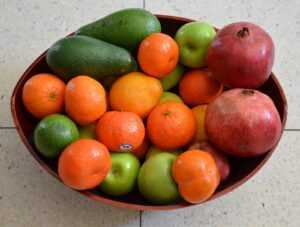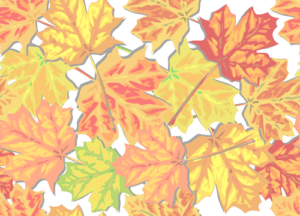 Autumn’s here!
The organic fruit selection is already transforming from autumn to winter with pomegranates, apples, persimmon, bananas, avocado, mango and a wide array of citrus fruits. And, even better: prices for winter fruit are much lower than summer, thus you can get a well-stocked fruit box for less!
From this week, the price for fruit boxes (one size) is 70 NIS – no more big or small boxes. Enjoy each morsel of these absolutely delicious, super-juicy fruit boxes.
Enjoy a sweet and pleasant autumn!
__________________________________
Autumn’s here!
The organic fruit selection is already transforming from autumn to winter with pomegranates, apples, persimmon, bananas, avocado, mango and a wide array of citrus fruits. And, even better: prices for winter fruit are much lower than summer, thus you can get a well-stocked fruit box for less!
From this week, the price for fruit boxes (one size) is 70 NIS – no more big or small boxes. Enjoy each morsel of these absolutely delicious, super-juicy fruit boxes.
Enjoy a sweet and pleasant autumn!
__________________________________
I’m so glad I live in a world where there are Octobers. It would be terrible if we just skipped from September to November, wouldn’t it? Look at these maple branches. Don’t they give you a thrill—several thrills? I’m going to decorate my room with them… -Ann Shirley, Anne of Green Gables
They say that we have no autumn in this country, that we have only two seasons, summer and winter. They claim that autumn and spring are fictitious seasons imported by Europeans who were pining for home… And yet, it is hard to let go of them. It’s hard to resolve that we’re only willing to live within two opposites, two extremes. We would like to taste some soft middle ground, something variable and fickle, not as fixed, not as acute, not as decisive. In our household, the closet is now a gentle autumn collaboration of good ol’ summer clothes alongside those winter clothes we dragged down from the top shelves. We wear long-sleeved shirts in the mornings and late afternoons. In the heat of the day, we even find the sun pleasant. Who would have believed this only a few short weeks ago? For me, this is proof that even in our decisive, definite and always unequivocal country, there is, after all, autumn.
The Hebrew for autumn is stav, and its Biblical connotations most likely referred to cloudy days:
For behold, the winter (stav) is past; the rain is over and gone. The flowers appear on the earth, the time of singing has come, and the voice of the turtledove is heard in our land. (Song of Songs, 2:11)
The Aramaic word stava means winter, while the Arabic shita is used for both winter and rain. In searching for a word for this season falling between summer and winter, for those days when the heat is diminished and the clouds begin to gather, they took the word stav and changed it to mean autumn. These are the days in which we rediscover how beautiful the skies look when they are adorned with clouds, and how irresistible sunsets can be in those “in-between” days.
Our field is teeming with many, many weeds that are soaking up the moisture and dew and irrigation, as well as those last daytime hours of soothing sunbeams. And we lean over our field beds and pluck the weeds meditatively. The insects have sprung back into action, after overcoming the shock of the Israeli summer. They are punching gaping holes into our greens. Here and there, aphid colonies are attempting to suck something out before their natural enemy, the parasitic wasp who always follows them, gets comfortably settled in. Birds are crossing our skies again, this time on their journey south. And these same skies are no longer a blinding white, but sport a rather bluish hue, dotted by clouds. Like we said: autumn.
The field is slowly bidding the summer veggies farewell, and happily welcoming the ripening of autumn vegetables. The greens that have begun occupying your boxes will continue to do so over the next few months: Swiss chard, mustard, arugula, tatsoi and, coming soon, kale. The herbs continue to grace our presence. Dill and cilantro are recovering from the heat and are nimbly growing. The lettuce – some of you met with its bitter summery side — will grow sweeter as the temperature falls, for they no longer have to fight for their life. They can now breathe, calm down and grow with less effort.
And under the earth, protected from the heat of summer by a thick layer of dirt, the first autumn roots are growing round/long/chubby. Autumn and winter are a celebration of roots. The plants shoot their nutrients to these underground storehouses for protection and storage, while we, in our unmitigated chutzpa, rob them a bit to enjoy the nutritious culinary wealth of these bunkers. This week, we continued to pull out sweet potatoes, joined by Jerusalem artichoke, purple beets and first little radishes. The radishes are particularly piquant this season due to the heat, but as it cools down they will become less tear-inducing and tongue-burning, and milder tasting. For those of you who prefer them spicy, now is the time to take a bite. If you like them milder, wait patiently–they promise to mellow soon.
There are some other hidden roots, already planted and seeded, whose maturing we patiently await. For some, we will have to wait at least two months; others will be ready very soon: celeriac, parsley root, turnip, daikon, potato and garlic. The latter we will only meet at the end of winter, just before spring. In the meantime, lots of cute, tiny garlic stems have sprouted in our beds, peeking from the ground to check out the situation as they begin their long journey. They can take heart from the Jerusalem artichoke, which spent a similar length of time in the ground during the opposite season, and now its flowers have dried up and he is slowly marking his territory in your boxes.
The broccoli, cauliflower, kohlrabi, and cabbage are no longer invisible. The first round is already strong and impressive. We will give them the time they need to develop the inflorescence scalps we’ve missed so much. For the time being, the plants themselves must strengthen and grow, after a not-so-easy time over the end of summer. When we plant them in mid-August, we spread a net over the saplings to provide relief from the scorching sun. By the time we plant the Autumn Brassicaceae’s, we no longer need artificial shade. The wispy clouds and lower temperatures make their acclimation easier. Right now, the field is hosting several rounds of kohlrabi, broccoli, cauliflower and cabbages, and soon-to-come are other members of this joyful autumny-wintery family. The last of the summer vegetables still occupy the field, somewhat startled by the cool air but holding on, albeit slowing down a bit. They will remain till the arrival of the cold weather and rain. Splendid eggplants are ripening on the plants, and short and long lubia continue to yield till they hand over the torch to the next runners in the legume relay race: the green bean and pea, both already blooming in good health. The okra is making its final attempts to produce pods and seeds, but its sojourn at Chubeza is already short-lived. Now is the time to blanch and freeze the okra for wintertime use. The red bell peppers are squeezing out every drop of heat and sun, to spur their efforts to redden and ripen.
We’ve harvested our last popcorn bed and are distributing these tough little cobs. Do not be confused– these are not sweet corn cobs, and even a long and stubborn cooking won’t soften them. Details and recipes for popcorn can be found in this newsletter.
Take a look at your boxes: The corn dwells with the Swiss chard and the pumpkin lies down with the beet. What an enchanting season! The field is verdant, with the transformation from summer to winter quite palpable in the air. The renewal and energy of the new vegetables infuses us with new energy as well (as will a drop in temperature, we must admit…) We are bidding farewell to a flaming summer, hoping to be met with a rainy winter, satiated by timely showers of the right quantities at the proper intervals. May we all be blessed with a great month of Cheshvan, full of happy new beginnings, the pleasures of a temperate season and the first baby steps into a New Year, and a smooth Acharei HaChagim entry into this season of change and renewal.
May we have only good, healthy days, Alon, Bat-Ami, Dror, Orin and the Chubeza team
_______________________________________________________
WHAT’S IN THIS WEEK’S BOXES?
Monday: Bell peppers, cherry tomatoes/Thai yard-long beans (lubia)/okra/short Iraqi lubia, arugula/tatsoi/basil, bunch of radishes/red beets, cucumbers, tomatoes, parsley/coriander/dill, lettuce, slice of Neapolitan pumpkin/carrots, sweet potatoes, corn/ potatoes.
Large box, in addition: Eggplant, popcorn/Jerusalem artichoke, New Zealand spinach/Swiss chard.
FRUIT BOXES: Apples/persimmons, avocados, mangos/pomegranates, oranges.
Wednesday: Bell peppers/eggplant/onions, Thai yard-long beans (lubia)/okra/short Iraqi lubia/Jerusalem artichoke, arugula/tatsoi, bunch of radishes/red beets, cucumbers, tomatoes, parsley/coriander/dill, slice of Neapolitan pumpkin, New Zealand spinach/Swiss chard, sweet potatoes, potatoes.
Large box, in addition: Carrots/cherry tomatoes, lettuce/basil, corn.
FRUIT BOXES: Apples, avocados, mangos, oranges.

